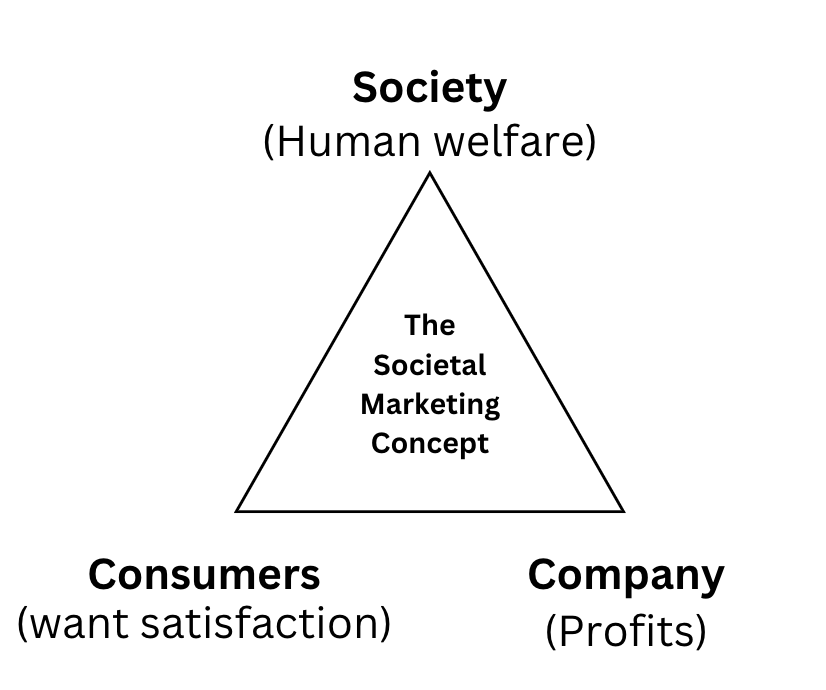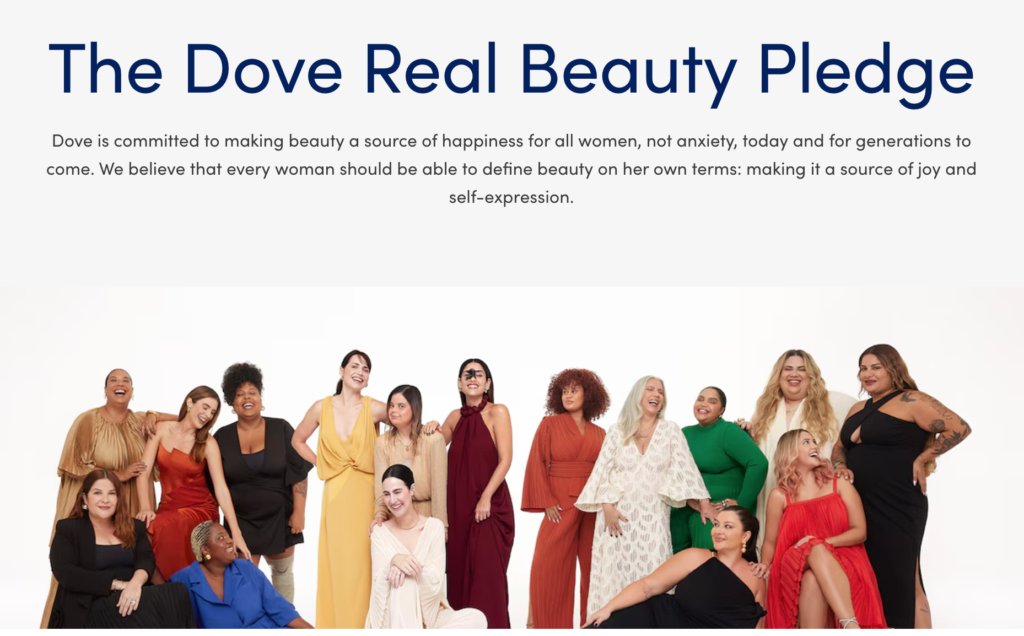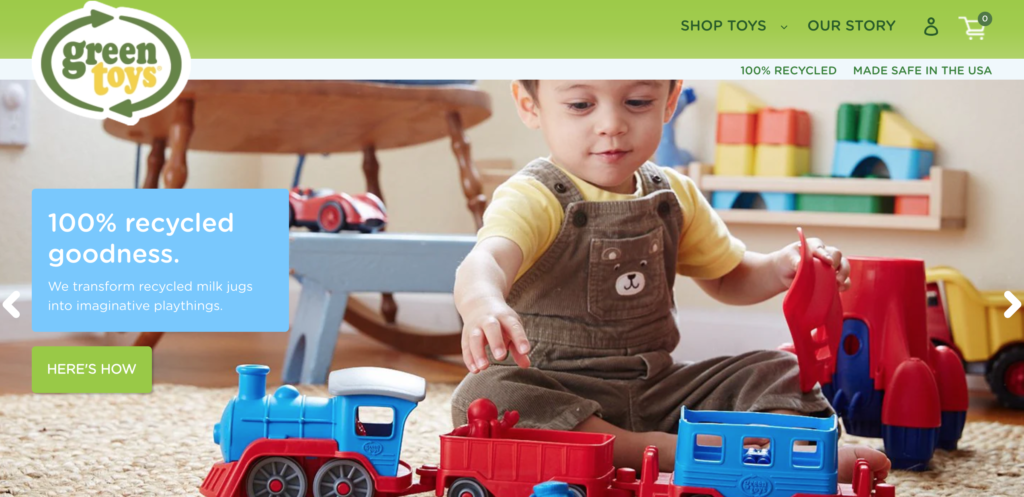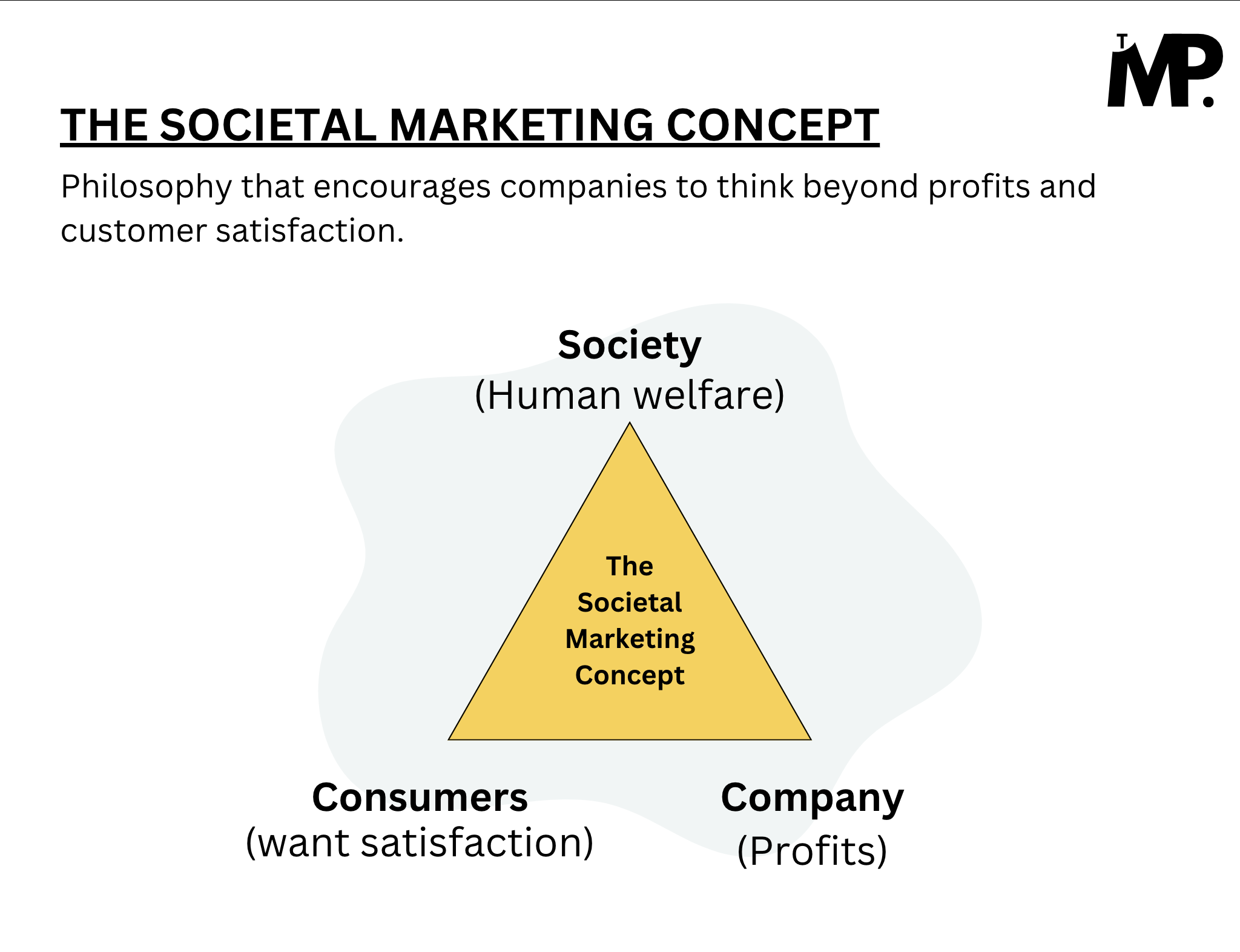Ever wondered what separates brands that simply sell from those that truly matter?
Think about the last time you chose one product over another because it aligned with your values. Maybe it was a brand committed to sustainability or a company that gave back to the community.
A recent study shows that 71% of consumers prefer brands that align with their values.
This shift has paved the way for a groundbreaking approach to marketing that balances;
- Consumer satisfaction
- Business profitability
- Societal well-being.
That’s the power of The Societal Marketing Concept.
So, what exactly is it, and why is it so important?
Let’s break it down.
What is the Societal Marketing Concept?
The societal marketing concept is a philosophy that encourages companies to think beyond profits and customer satisfaction. It suggests that businesses should also focus on the long-term well-being of society when making marketing and operational decisions.
It is one of the five marketing concepts.
For example, Patagonia, an outdoor clothing brand, is a great illustration of the societal marketing concept. Patagonia focuses on making high-quality apparel, but they also prioritize sustainability. They use eco-friendly materials, work to reduce their carbon footprint, and promote recycling through initiatives like their “Worn Wear” program.
As a result, customers trust the brand not only for its quality but also for its ethical practices.
This trust strengthens customer loyalty and supports the company’s profitability, all while contributing positively to the environment.
In today’s world, where consumers are becoming more socially conscious, companies that adopt the societal marketing concept often stand out. They attract customers who align with their values and foster goodwill among stakeholders. In turn, this leads to long-term success and a positive reputation.
It is a way for businesses to grow responsibly. By aligning their goals with the needs of their customers and the greater good of society, companies can make a difference while staying profitable.
It’s not just about selling products or services—it’s about building a better future.
Also read: Why is social responsibility important to a business?
Three Components of the Societal Marketing Concept
To truly understand this concept, think of it as a triangle where the three sides represent Society, Consumers, and Company Profits. These elements work in harmony to create lasting value.

1. Society:
Instead of just thinking about customer needs and profits, businesses are urged to make decisions that:
- Protect natural resources
- Promote sustainability
- Support social causes
In today’s world, businesses are expected to do more than just meet customer needs—they are expected to make a positive contribution to society. The societal marketing concept encourages companies to balance profit-making with responsibility to the environment and the community.
Adopting the societal marketing concept isn’t just the right thing to do—it’s also good for business. By growing responsibly, businesses create long-term value while making a meaningful difference in the world.
Key points to take note of:
- Focus on society’s well-being, not just profits.
- Protect the planet and promote sustainability.
- Support social causes and build trust with your audience.
- Foster long-term value for future generations.
2. Consumer:
Customers today don’t just want a product—they want a product that aligns with their core values.
This concept encourages businesses to offer products and services that:
- Provide real value to customers
- Align with customers’ values like sustainability, quality, or social responsibility
- Focus on building long-term relationships rather than just making sales
- Understand customer values: Go beyond what customers need—what do they care about?
- Offer meaningful solutions: Provide products or services that add real value while reflecting those beliefs.
- Build trust and loyalty: When companies meet (and exceed) customer expectations, they forge stronger, longer-lasting relationships.
Key points to take note of:
- Focus on exceeding customer expectations, not just meeting them.
- Align your offerings with customers’ values like sustainability and social responsibility.
- Build trust and loyalty by providing meaningful solutions that reflect what your customers care about.
3. Company (Profits at the Bottom-Right):
Businesses should care about more than just making money—they should also focus on benefiting society and their customers. But, profitability is key. Without profitability, it’s hard to make an impact on society.
because it enables businesses to continue their work and expand their positive influence.
In simple terms: Profits fuel progress.
You might think social responsibility and making money are separate goals. In reality, they go hand-in-hand. Here’s why:
- Profitability provides the resources needed to support values and continue making a positive difference in society.
- Profitable businesses have the ability to invest in innovation, creating better products and reaching more customers.
- Without profit, even the best-intentioned businesses can’t survive. Staying profitable ensures that businesses can scale their efforts and continue to grow.
Key points to take note of:
- Profitability is essential for supporting societal goals and ensuring business longevity.
- A balance between social impact and profit leads to sustainable growth.
- Reinvesting profits allows businesses to expand their positive influence and create better products.
By achieving this balance, businesses can thrive and make a meaningful difference, both for their customers and society as a whole.
Advantages of the Societal Marketing Concept
The Societal Marketing Concept offers several benefits to companies that choose to implement it’
- Brands build trust when they prioritize societal good.
- Companies that adopt this approach often enjoy long-term profitability.
- Ethical practices attract customers who value sustainability and responsibility.
- Acting responsibly helps companies avoid fines or reputational damage.
- Employees are more motivated when they work for a purpose-driven company.
Disadvantages of the Societal Marketing Concept
There are also challenges that businesses need to consider when adopting it;
- Implementing socially responsible practices can be expensive.
- Balancing profits, consumer needs, and societal welfare requires careful planning.
- The benefits of societal marketing often take time to materialize.
- If not implemented authentically, it can backfire and damage credibility.
3 Examples of Brands Using the Societal Marketing Concept
Several leading companies have successfully integrated this concept into their operations, showing that doing good for society and making profits can go hand-in-hand.
Following are the companies which prove that societal marketing can drive both business success and societal welfare.
1. Unilever: A Leader in Sustainability and Social Impact
Unilever is a global powerhouse that has successfully intertwined sustainability and social responsibility into its business model. Unilever is Cutting Carbon in Ingredients & Materials to make eco-friendly formulations. Unilever is committed to reducing plastic waste by ensuring that all its plastic packaging is reusable, recyclable, or compostable by 2025. This initiative strengthens Unilever’s reputation as a leader in sustainability and societal marketing
Dove’s Real Beauty Campaign is a prime example of how Unilever uses its influence for societal good. It promotes body positivity challenges unrealistic beauty standards.

2. Tesla: Innovating for a Sustainable Future
Tesla is a game-changer in the automobile industry and a strong advocate for environmental sustainability. Their dedication to innovative technology and sustainable energy shows how a company can embrace societal marketing while driving business success.
Tesla’s core mission is to reduce the world’s dependence on fossil fuels. They produce electric vehicles (EVs), solar products, and energy storage solutions, all aimed at reducing global carbon emissions. The launch of the Tesla Model 3 made electric vehicles more affordable and accessible to the mass market. Tesla Model 3 has also scored 5-Star Green NCAP Rating. Tesla helped reduce the carbon footprint of consumers while still ensuring profitability for Tesla.
Tesla also focuses on sustainable energy practices, including the Powerwall—a home energy storage system. This helps consumers use renewable energy more effectively, while battery recycling further supports their environmental goals.
3. Green Toys: Leading with Eco-Friendly Play

Green Toys is an excellent example of a company that focuses on both environmental sustainability and customer satisfaction. They create eco-friendly toys made entirely from recycled materials, and their marketing reflects their strong commitment to societal well-being.
Green Toys uses recycled plastic, primarily from milk jugs, to create durable, safe, and environmentally friendly toys. This helps reduce plastic waste while ensuring that the products are both safe and sustainable for children.
You can read Green Toys’ Story.
Every aspect of Green Toys’ business, from manufacturing to packaging, reflects their commitment to sustainability. They avoid harmful chemicals and produce products that promote environmental responsibility for both kids and parents.
Why These Companies Stand Out in Societal Marketing
Unilever, Tesla, and Green Toys have shown that businesses can succeed while putting society first. Here’s why they’re standout examples:
- All three companies have taken meaningful steps to reduce environmental harm—whether it’s through reducing waste, using recycled materials, or promoting renewable energy.
- These companies maintain high ethical standards in their production processes. This not only benefits society but also helps to build consumer trust.
- They understand that making decisions for the greater good helps boost brand reputation, increase customer loyalty, and ensure long-term profitability.
Their ability to align business practices with broader social and environmental goals has set them apart as leaders in both their industries and in corporate responsibility.
Conclusion: What Marketers Should Keep in Mind
As a marketer, here’s the golden rule: Think beyond profits. Consumers today don’t just buy products; they invest in brands that align with their values. To embrace the Societal Marketing Concept effectively:
- Focus on Authenticity: Avoid greenwashing or making false claims.
- Create Shared Value: Align your goals with societal and consumer interests.
- Communicate Your Efforts: Let customers know how your actions benefit society.
- Measure Impact: Track how your initiatives contribute to societal welfare and use that data to improve further.
The Societal Marketing Concept is more than a strategy — it’s a mindset that builds meaningful connections with customers, drives positive change, and ensures long-term success.

1 Comment